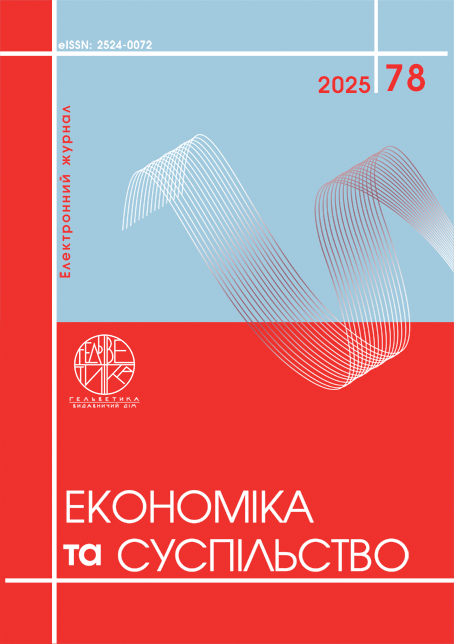INTEGRATED MODEL FOR IMPLEMENTING SUSTAINABLE DEVELOPMENT REPORTING
Abstract
This article presents an integrated operating model for sustainability reporting that reconciles the expanding ESRS scope with the managerial reality of complex organizations. The paper details a staged implementation that connects strategic alignment, control architecture, and data governance, and documents acceptance criteria and evidence at each stage. It treats reporting not as a document but as an internal, governable process that creates information value and supports independent assurance. Strategic alignment is achieved through a 7S-TBL-ESRS mapping that links McKinsey’s elements to the Triple Bottom Line and ESRS blocks, translating principles into objectives, KPIs, policies and disclosures. Acceptance criteria include a board-approved Risk Appetite Statement (RAS) with thresholds and triggers, ESG objectives embedded in budgeting and incentives, and a completed mapping with explicit owners and MCS/SCS/IMS processes, evidenced by protocols, plans, expert opinions and IMS data, validation and change logs. Unity of data and control is delivered by a triune architecture: MCS allocates decision rights and escalation, SCS monitors indicators against RAS thresholds, and IMS standardizes sources and metadata, maintains quality logs and lineage, and preserves an auditable trail. Thresholds τᵢ are wired to SCS monitoring and MCS procedures so deviations automatically trigger predefined actions and timelines, turning risk appetite into an operational control surface. The model addresses organizational fragility and manual reporting defects through maturity-based scaling and an assurance-by-design information perimeter that secures access, logging and third-party interaction, lowering the transaction cost of assurance. As a result, the architecture and alignment matrix produce reproducible, decision-useful disclosures and stable reporting cycles.
References
Безверхий К. В. Методичні засади формування інтегрованої звітності підприємства. Облік і фінанси. 2014. № 3(65). C. 8-14.
David J. Cooper & Wayne Morgan. Meeting the evolving corporate reporting needs of government and society: arguments for a deliberative approach to accounting rule making, Accounting and Business Research. 2013. Vol. 43, No. 4, pp. 418-441. DOI: https://doi.org/10.1080/00014788.2013.794411
Bosi, M.K.; Lajuni, N.; Wellfren, A.C.; Lim, T.S. Sustainability reporting through environmental, social, and governance: a bibliometric review. Sustainability. 2022. Vol. 14, No. 19. 12071. DOI: https://doi.org/10.3390/su141912071
Doherty, R., Kampel, C., Koivuniemi, A., Pérez, L., & Rehm, W. (2023, 08). Revenue growth is good. Profitable growth is better. Profitable growth that advances ESG priorities is best. Here’s how outperformers who actively choose growth deliver the growth trifecta. https://www.mckinsey.com/capabilities/strategy-and-corporate-finance/our-insights/the-triple-play-growth-profit-and-sustainability (дата звернення: 05.08.2025)
Goasduff, L. (2019). Create a Data-Driven Culture by Influencing 3 Areas. Retrieved from https://www.gartner.com/smarterwithgartner/create-a-data-driven-culture-by-influencing-3-areas (дата звернення: 01.09.2025)
Beretta, V., Demartini, M. C., & De Villiers, C. (2025). Integrated reporting: Developing an injustice assessment framework and a research agenda. Accounting, Auditing & Accountability Journal, 38(9), 1–29. https://doi.org/10.1108/AAAJ-02-2024-6917
Project Management Institute (Ред.). (2004). A guide to the project management body of knowledge (PMBOK guide) (3rd ed). Project Management Institute, Inc.
Committee of Sponsoring Organizations of the Treadway Commission. (2013). Internal control-Integrated framework. COSO.
Committee of Sponsoring Organizations of the Treadway Commission. (2023). Achieving effective internal control over sustainability reporting (ICSR): Building trust and confidence through the COSO Internal Control -Integrated Framework. COSO.
Mainiero, L. A., & Tromley, C. L. (1994). Developing managerial skills in organizational behavior: Exercises, cases, and readings (2nd ed.). Prentice Hall.
Kerzner, H. (2018). Using the project management maturity model: Strategic planning for project management (Third edition). John Wiley & Sons, Inc.
Bezverkhyi K. V. (2014) Metodychni zasady formuvannia intehrovanoi zvitnosti pidpryiemstva [Methodological principles for the formation of integrated reporting of an organisation]. Oblik i finansy – Accounting and Finance, no 3(65), pp. 8-14. (in Ukrainian).
Cooper, D. J., & Morgan, W. (2013). Meeting the evolving corporate reporting needs of government and society: Arguments for a deliberative approach to accounting rule making. Accounting and Business Research, 43(4), 418–441. https://doi.org/10.1080/00014788.2013.794411
Bosi, M. K., Lajuni, N., Wellfren, A. C., & Lim, T. S. (2022). Sustainability reporting through environmental, social, and governance: A bibliometric review. Sustainability, 14(19), 12071. https://doi.org/10.3390/su141912071
Doherty, R., Kampel, C., Koivuniemi, A., Pérez, L., & Rehm, W. (2023, August). Revenue growth is good. Profitable growth is better. Profitable growth that advances ESG priorities is best: Here’s how outperformers who actively choose growth deliver the growth trifecta. McKinsey & Company. Retrieved August 5, 2025, from https://www.mckinsey.com/capabilities/strategy-and-corporate-finance/our-insights/the-triple-play-growth-profit-and-sustainability
Goasduff, L. (2019). Create a data-driven culture by influencing 3 areas. Gartner. Retrieved September 1, 2025, from https://www.gartner.com/smarterwithgartner/create-a-data-driven-culture-by-influencing-3-areas
Beretta, V., Demartini, M. C., & De Villiers, C. (2025). Integrated reporting: Developing an injustice assessment framework and a research agenda. Accounting, Auditing & Accountability Journal, 38(9), 1–29. https://doi.org/10.1108/AAAJ-02-2024-6917
Project Management Institute. (2004). A guide to the project management body of knowledge (PMBOK® Guide) (3rd ed.). Project Management Institute.
Committee of Sponsoring Organizations of the Treadway Commission. (2013). Internal control—Integrated framework. COSO.
Committee of Sponsoring Organizations of the Treadway Commission. (2023). Achieving effective internal control over sustainability reporting (ICSR): Building trust and confidence through the COSO Internal Control–Integrated Framework. COSO.
Mainiero, L. A., & Tromley, C. L. (1994). Developing managerial skills in organizational behavior: Exercises, cases, and readings (2nd ed.). Prentice Hall.
Kerzner, H. (2018). Using the project management maturity model: Strategic planning for project management (3rd ed.). John Wiley & Sons.
Copyright (c) 2025 Святослав Білобловський

This work is licensed under a Creative Commons Attribution 4.0 International License.


